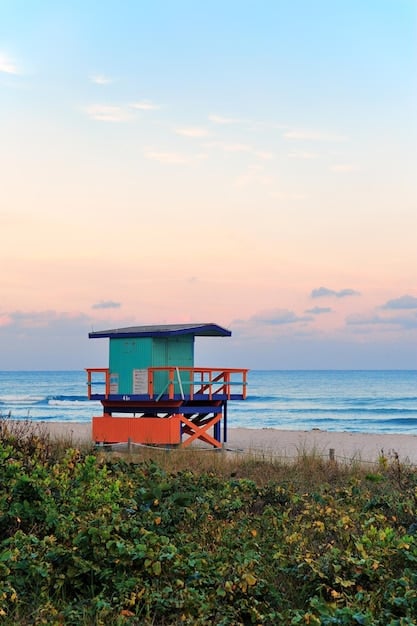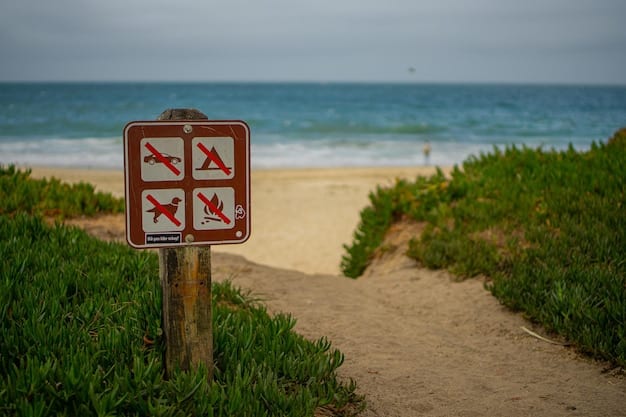New Regulations Impacting Luxury Beach Resorts: Private Beach Access Alert

New regulations impacting private beach access at luxury resorts are emerging, potentially altering the exclusivity and amenities offered, requiring both resorts and guests to understand these changes to ensure compliance and enjoyment.
The allure of a luxury beach resort often includes the promise of pristine, private beaches. However, recent developments signal a shift in how these exclusive spaces are regulated. Understanding the implications of these changes is crucial for both resorts and guests. Be aware about new regulations impacting private beach access at luxury resorts.
New Regulations on Private Beach Access: An Overview
Private beach access has long been a selling point for luxury resorts, offering guests a sense of exclusivity and tranquility. However, the legal landscape surrounding these beaches is changing, with new regulations aiming to balance private use with public rights.
These regulations vary by location, but common themes include increased public access, environmental protection measures, and restrictions on construction and development. Understanding these changes is essential for resorts to maintain compliance and for guests to know their rights.
Key Areas Affected by the New Regulations
New rules are impacting several key aspects of private beach access at luxury resorts. Let’s explore some of the most significant changes.
- Public Access: Many new regulations focus on ensuring that the public has reasonable access to beaches, even those adjacent to private properties.
- Environmental Protection: Stricter rules are being implemented to protect coastal ecosystems, including restrictions on development, waste disposal, and the use of motorized vehicles.
- Construction Restrictions: New construction or modifications to existing structures on or near beaches may face stricter scrutiny and permitting requirements.
- Permitting and Compliance: Resorts may need to obtain new permits or update existing ones to comply with the latest regulations, which can involve detailed environmental impact assessments and public consultations.
In summary, the new regulations aim to balance private interests with public welfare and environmental sustainability. Resorts need to adapt to these changes to maintain their appeal while adhering to the law.

Understanding the Legal Basis for Beach Access Regulations
The authority to regulate beach access stems from a complex interplay of federal, state, and local laws. Understanding the legal basis for these regulations is essential for resorts and guests alike.
In the US, states generally have broad authority over coastal management, but federal laws, such as the Coastal Zone Management Act, provide a framework and financial incentives for states to develop comprehensive coastal management plans. These plans often include provisions for public access, environmental protection, and development controls.
Key Legal Principles Governing Beach Access
Several legal principles form the foundation for beach access regulations. Here’s a quick review:
- Public Trust Doctrine: This long-standing legal principle holds that certain natural resources, including tidelands and navigable waters, are held in trust by the government for the benefit of the public.
- Eminent Domain: The government has the power to take private property for public use, provided that just compensation is paid to the owner. This power can be used to acquire beach access easements.
- Regulatory Takings: Regulations that unduly restrict the use of private property may be considered a “regulatory taking,” requiring the government to compensate the property owner.
Navigating this legal landscape requires careful attention to the specific laws and court decisions in each jurisdiction. Resorts should consult with legal experts to ensure they are in compliance with all applicable regulations.
How New Regulations Impact Luxury Resorts
The new regulations on private beach access can have a significant impact on luxury resorts, affecting their operations, amenities, and overall appeal.
Resorts may face increased costs for permitting, compliance, and environmental protection measures. They may also need to modify their offerings to accommodate greater public access or to comply with stricter environmental standards.
Operational and Financial Impacts
The operational and financial impacts of the new regulations can be considerable. Here’s what luxury resorts need to consider:
- Increased Compliance Costs: Resorts may need to invest in environmental impact assessments, permit applications, and ongoing monitoring to ensure compliance.
- Reduced Exclusivity: Requirements to provide public access can diminish the sense of privacy and exclusivity that many guests seek.
- Potential Revenue Loss: Restrictions on development or amenities can limit revenue-generating opportunities.
Despite these challenges, resorts can adapt by focusing on sustainable practices, enhancing guest experiences, and working collaboratively with regulators and local communities.
Strategies for Resorts to Adapt to the Changing Landscape
Adapting to the changing landscape of beach access regulations requires a proactive and strategic approach. Resorts need to address compliance issues, enhance guest experiences, and engage with stakeholders.
One effective strategy is to invest in sustainable practices that minimize environmental impact and enhance the natural beauty of the beach. This can include implementing waste reduction programs, protecting dune ecosystems, and using eco-friendly products.
Effective Adaptation Strategies for Luxury Resorts
Here are more useful ideas.
- Embrace Sustainability: Promote eco-friendly practices to enhance environmental responsibility and appeal to eco-conscious travelers.
- Enhance Guest Experiences: Offer unique and exclusive experiences that differentiate the resort from others, such as private beach bonfires or guided nature walks.
- Engage with Stakeholders: Work collaboratively with regulators, local communities, and environmental organizations to find solutions that balance private and public interests.
By embracing these strategies, resorts can turn regulatory challenges into opportunities to enhance their reputation, attract new customers, and contribute to the long-term health of coastal ecosystems.

Tips for Guests: Understanding Your Rights and Options
As a guest at a luxury beach resort, it’s important to understand your rights and options regarding beach access. New regulations can impact what you can expect during your stay.
Before booking, inquire about the resort’s policies on beach access, including any restrictions or limitations that may be in place. Ask about the availability of private beach areas, the extent of public access, and any environmental protection measures that may affect your use of the beach.
What Guests Should Know
Here are some key things every guest can do:
- Inquire About Beach Policies: Ask about beach access rules before booking your stay.
- Respect the Environment: Follow posted guidelines for protecting coastal ecosystems.
- Be Aware of Your Rights: Understand the extent of public access and any restrictions that may apply.
By being informed and proactive, you can ensure a more enjoyable and responsible beach vacation.
Case Studies: Resorts Successfully Navigating New Regulations
Several luxury resorts have successfully navigated the challenges posed by new beach access regulations, demonstrating that compliance and guest satisfaction can coexist.
One example is the Ocean Vista Resort, which proactively engaged with local regulators and environmental groups to develop a sustainable beach management plan. The plan included measures to protect dune ecosystems, reduce waste, and provide limited public access to a portion of the beach.
Key Takeaways from Successful Case Studies
- Proactive Engagement: Engage with regulators and stakeholders early in the process.
- Sustainable Practices: Implement measures to protect the environment.
- Creative Solutions: Develop innovative solutions that balance private and public interests.
These examples demonstrate that by taking a proactive, collaborative, and sustainable approach, luxury resorts can successfully adapt to the changing regulatory landscape while maintaining their appeal to guests.
| Key Point | Brief Description |
|---|---|
| 🔑 New Regulations | Impacts private beach access due to public access and environmental concerns. |
| ⚖️ Legal Basis | Stems from federal, state, and local laws; emphasizes public trust doctrine. |
| 🏖️ Resort Strategies | Include sustainability, enhanced guest experiences, and stakeholder engagement. |
| 💡 Guest Tips | Inquire about beach policies, respect environment, and understand your rights. |
FAQ
▼
New regulations focus on balancing private use with public access, implementing environmental protection measures, and restricting construction near beaches. Specifics vary by location.
▼
Luxury resorts may face increased compliance costs, reduced exclusivity due to public access, and potential revenue loss from development restrictions. Legal consultation is essential.
▼
Strategies include embracing sustainability, enhancing guest experiences with creative offerings, and engaging collaboratively with regulators and local communities for effective solutions.
▼
Guests should inquire about beach policies before booking, respect environmental guidelines, and be aware of their rights regarding public access and any restrictions during their stay.
▼
Ocean Vista Resort proactively developed a sustainable beach management plan with regulators, including waste reduction, ecosystem protection, and limited public access, balancing private and public interests.
Conclusion
Navigating the evolving landscape of private beach access regulations at luxury resorts requires a balanced approach. By understanding the legal basis, embracing sustainable practices, and engaging with stakeholders, resorts can adapt to these changes while continuing to offer exceptional experiences for their guests. By staying informed and proactive, both resorts and guests can ensure that these beautiful coastal environments are enjoyed responsibly for years to come.





